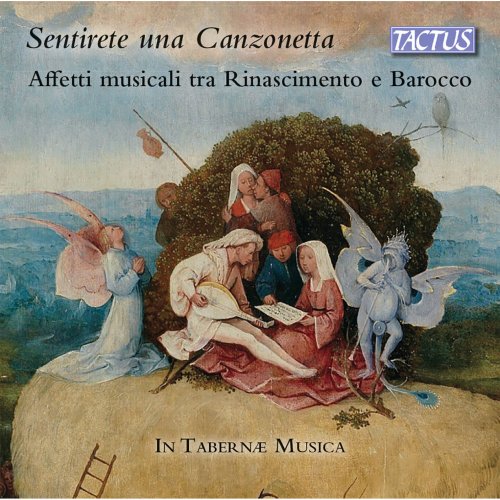
In Tabernae musica - Sentirete una canzonetta (2016)
BAND/ARTIST: In Tabernae musica
- Title: Sentirete una canzonetta
- Year Of Release: 2016
- Label: Tactus
- Genre: Classical
- Quality: FLAC (tracks, booklet)
- Total Time: 1:00:51
- Total Size: 311 MB
- WebSite: Album Preview
Tracklist:
01. Santì la bell'istoria
02. Fuggi, fuggi, fuggi
03. Libro primo di villanelle: Begli occhi lucenti
04. Ciaccona [17th Century]
05. Cecona [17th Century]
06. Sy vos pretendeys
07. Usurpator tiranno
08. Canzoni da sonare, Book 1: Canzona for 2 Canti
09. Sta pur ben nostro bel fusto
10. Cantade: Accenti queruli
11. Madrigali et arie: Damigella tutta Bella
12. Monicha [17th Century]
13. Folle e ben che si crede
14. De' miei preghi tutt'altera
15. O bellissimi capelli
16. 5 Dances: No. 3. Schiarazula marazula
17. Si dolce e'l tormento, SV 332
18. Curtio precipitato et altri capricii, Book 2, Op. 13: Sentirete una canzonetta
01. Santì la bell'istoria
02. Fuggi, fuggi, fuggi
03. Libro primo di villanelle: Begli occhi lucenti
04. Ciaccona [17th Century]
05. Cecona [17th Century]
06. Sy vos pretendeys
07. Usurpator tiranno
08. Canzoni da sonare, Book 1: Canzona for 2 Canti
09. Sta pur ben nostro bel fusto
10. Cantade: Accenti queruli
11. Madrigali et arie: Damigella tutta Bella
12. Monicha [17th Century]
13. Folle e ben che si crede
14. De' miei preghi tutt'altera
15. O bellissimi capelli
16. 5 Dances: No. 3. Schiarazula marazula
17. Si dolce e'l tormento, SV 332
18. Curtio precipitato et altri capricii, Book 2, Op. 13: Sentirete una canzonetta
In practical terms, we might imagine we are taking a walk in a street of an Italian city, at the beginning of the seventeenth century. Our gaze and our attention are attracted by a series of musical objects that come from different backgrounds: each, in its own way, relates and represents a different possible interaction between man and music, between the needs of the former and the function of the latter. So the musical content of this CD presents a cross-section of the typical aesthetic features and diversified representative expressions that were most appreciated by the public during the late Renaissance and early Baroque. The idea of the opposition between thesis and antithesis became the driving force of an astonishing creativeness. Ciaccone, passacaglie, canzonette, villanelle and various dances were the synthesis of an ardent, sparkling musical and social energy. The style of the ensemble’s performance stems chiefly from the study of the iconographic sources, from which there emerges an artistic production that is targeted not exclusively at the educated class, but also, and above all, at the people: the practice of music was enjoyed in the streets, houses and taverns, and often depicted in joyful, sensual, lewd attitudes. Precisely in those places where there was no etiquette, music became an “art form” and a mirror of the period, perhaps in a more complete, genuine way than it did elsewhere.
Year 2016 | Classical | FLAC / APE
As a ISRA.CLOUD's PREMIUM member you will have the following benefits:
- Unlimited high speed downloads
- Download directly without waiting time
- Unlimited parallel downloads
- Support for download accelerators
- No advertising
- Resume broken downloads


